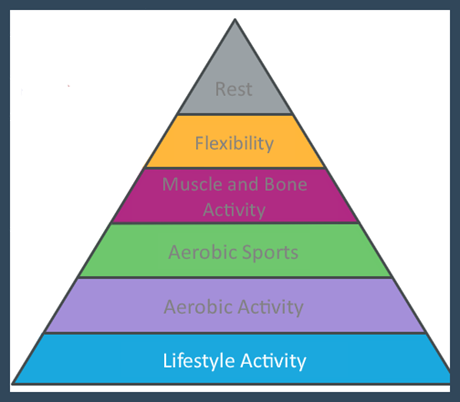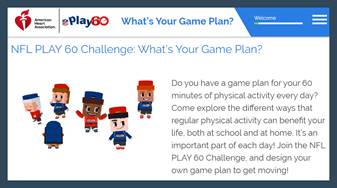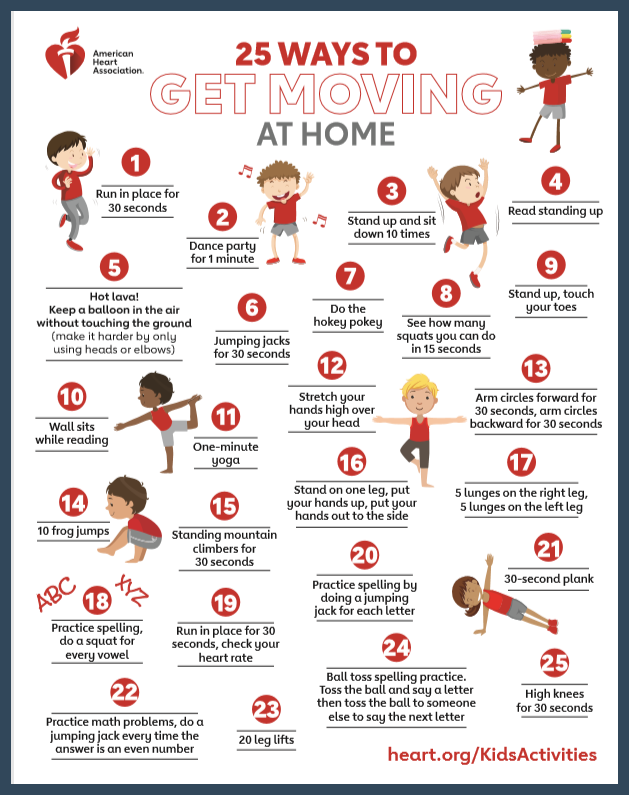Benefits of Physical
Activity

Section A: What's Your Game Plan?
Learn the
science behind how regular physical activity positively impacts us physically,
mentally, socially, and academically. Along the way, you will get tips and
information about different activities that can help you reach their
recommended 60 minutes or more of physical activity each day.
Various
types of physical activity should be part of your game plan. But, what are
they, how are they different, and why are they essential for your health?
|
Aerobic Activity |
Muscle–Strengthening Activity |
Bone–Strengthening Activity |
|
Moderate- or vigorous-intensity aerobic physical activities
should make up most of your daily game plan. Aerobic activities involve
rhythmically moving large muscles. |
Muscle-strengthening activities should also be part of your
game plan. Your muscles are working hard to hold against an applied force or
weight for a short period of time. This can be done with specific equipment,
like weights and resistance bands, or by using your body weight. |
Bone-strengthening activities should also be part of your game
plan. The force that is put on the bones promotes bone growth and strength.
That force is mostly from the impact with the ground. |
|
Examples include hiking, biking, brisk walking, running, jumping rope,
swimming, mowing the lawn, canoeing, skateboarding, and playing many sports. |
Examples include push-ups, sit-ups. Wall climbing, squats, lunges, and
games like tug-of-war. |
Examples include jumping rope, running, skipping and hopping, and
playing many sports. |
Regular physical
activity can benefit your body.
·
Bone-strengthening
activities, like running and jumping, develop strong bones.
·
Physical Activity can reduce
your risk of heart disease and type 2 diabetes.
·
Physical Activity should be
fun
Regular
physical activity also has many benefits related to learning.
·
Physically active students
tend to have better grades.
·
Being physically active can
help improve your focus, concentration, and memory.
Physical Activity
can benefit how you feel about yourself and how you interact with others.
·
Regular participation in
aerobic physical activity may help improve your mood and general well-being.
·
Physical Activity can help
provide opportunities to spend time with family and friends.
Let's Practice: Click on the image below for NFL Play 60
Section B: Benefits of Daily Activity
Physical Activity and Rest VIDEO
The promotion of daily physical activity for youth and adolescents
has been more of a priority concerning physical education. You must have a plan and goal of regular
physical activity to maintain your fitness and health. Building physical Activity in your early life
will have benefits for your future.
The following are a few benefits of daily physical activity.
·
Improve health-related fitness
·
Promotes learning
·
Boost physical wellness
·
Prolong optimal health
·
Improve mental health and mood
Parents and guardians can encourage and benefit physical Activity
at home. Below are some tips:
·
Provide opportunities to be active in a safe area
·
Provide equipment and supplies
·
Put limits on screen time
·
Participate in physical activity with your child
·
Develop good physicals to build confidence
|
The
Most Important Hour of Your Day |
|
It's a fact: physical Activity
helps to keep you healthy. But sometimes, physical Activity can seem like
hard work! But did you know that with at least 60 minutes a day of physical activity,
you can experience most of the health benefits? And it's worth it. Here are
four significant benefits of physical activity. 1. Did you know that physical activity
boosts mental wellness? Participating in regular physical activity
can relieve anxiety and depression. You may not only notice a "feel-good
sensation" immediately following your physical activity, but most people
also note an improvement in general well-being as physical activity becomes a
part of their daily routine. 2. Did you know you could learn
better in school if you participate in physical activity? Research
shows that students who are regularly physically active tend to do better on
academic tests and in class. 3. Did you know that physical activity
can make you healthier? Physical Activity can help lower the risk of
heart disease, overweight and obesity, and type 2 diabetes. 4. Did you know physical activity
may prolong your optimal health? Regular physical activity helps the
body stay healthy and function well. One study suggests that people who are
physically active and at a healthy weight live on average about seven years
longer than those who are not active and are obese. |
Let’s Practice:
Section C: Physical Activity
Pyramid

The Physical Activity Pyramid guidelines are provided by the United
States Department of Health and Human Services says that young adults should be
active at least 60 minutes a day. The
majority of that Activity should come from moderate to vigorous activities. Muscular-strengthening and bone-strengthening
activities should take place at least three days per week.
Below is a list of physical activities on the pyramid with
examples.
1. Lifestyle Activity: walking,
bicycling, skateboarding, housework, yardwork, playing active games, dancing,
work-active jobs
2. Aerobic Activity: aerobic
dance, aerobic gym equipment, aerobic bicycling, aerobic running, aerobic
skating
3. Aerobic Sports: field sports
(baseball, soccer, football), court sports (basketball, volleyball, hockey),
racquet sports
4. Muscle and Bone Activity: gymnastics, cheer, drill teams, track and
field, weightlifting, wrestling, skipping, running, jumping
5. Flexibility: martial arts, stretching, yoga, ballet
6. Rest: schoolwork, homework,
reading, talking, working, playing music, sleeping
Unit Activity Log
Throughout this course, you will be given more examples of
warm-ups, exercise activities, and cooldowns. If you have any questions or concerns at any
time, please message your teacher. Below
is a chart provided by the American Heart Association that you can utilize to
complete your "Unit Activity Logs."

